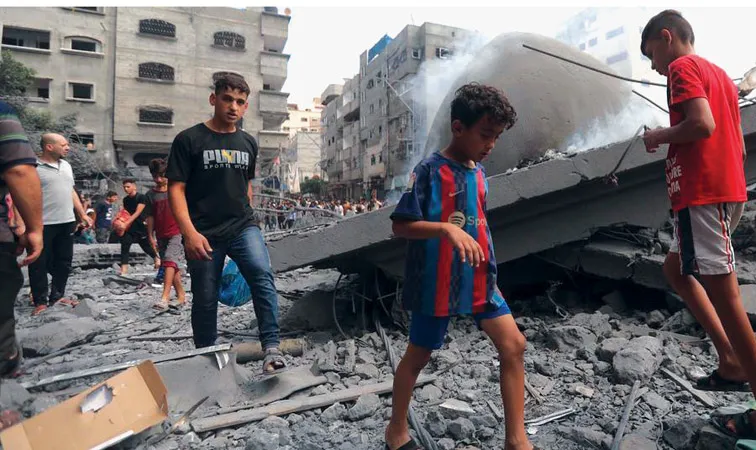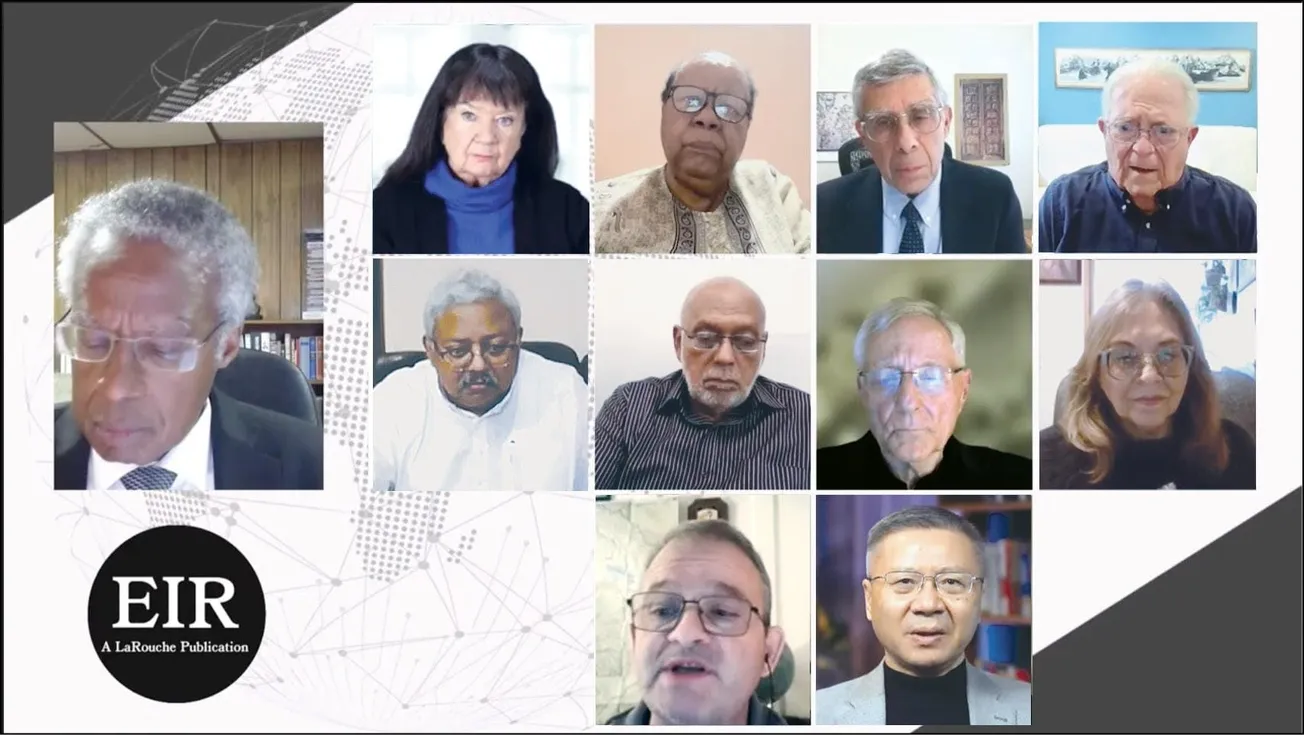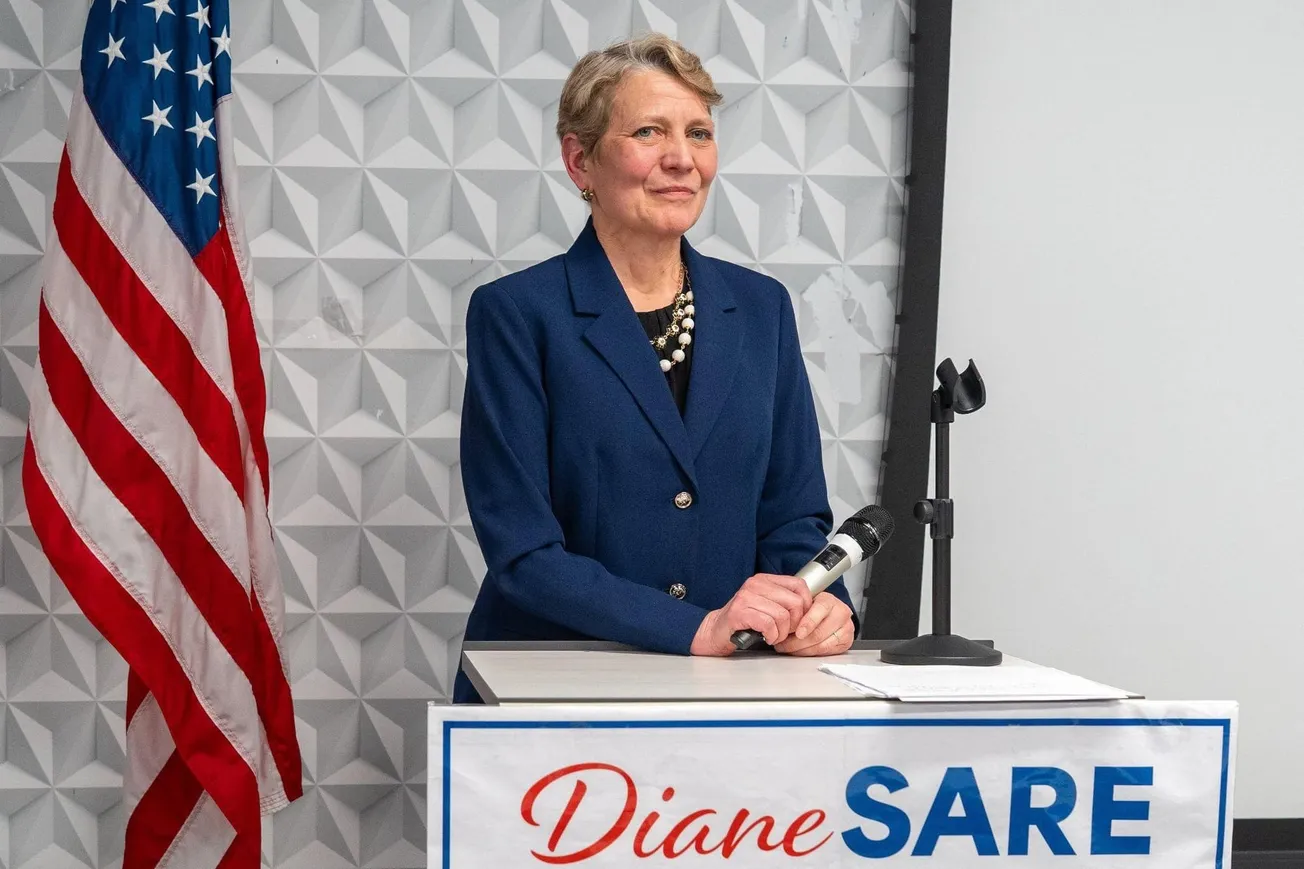This is an edited transcript of Harley Schlanger’s weekly dialogue with Helga Zepp-LaRouche, founder and chairwoman of the Schiller Institute on Wednesday, Nov. 1, 2023. Subheads and embedded links have been added. The video of this dialogue is available here.
Harley Schlanger: Hello and welcome to our webcast. You referred to the horrors in Southwest Asia as stemming in the modern period from the “Bernard Lewis Plan.” Bernard Lewis was a British historian and intelligence figure, who promoted the use of religious differences and conflict as a British imperial scheme to divide and conquer, to maintain British imperial control. But you also referred to a very different philosophical outlook, that of Cardinal Nicolaus of Cusa in the middle of the 15th century, who presented a vision of perpetual peace, that could be constituted based on the concordance of all religions.
Given the disasters that have been unleashed in Gaza following the Oct. 7 Hamas raid and Israeli response, how could this method of Cusa’s provide a solution today?
The Horror Engulfing Southwest Asia
Helga Zepp-LaRouche: It may be difficult to imagine. Anybody who is looking at what is happening at this point in Gaza, this is just unbelievable. I think it’s really important that people do not push aside the killing which is going on, under the pretext of getting rid of Hamas, bombing refugee camps and defenseless civilians, killing thousands of children! The world has to wake up! The enormity of what is going on is very, very difficult to cope with, and I would really urge people who are listening to this broadcast to engage in what is actually happening and not brush it aside with the idea of whatever ready-made opinions you may have. Because I think this is really the test of morality of mankind, if we can stop this.

The Director of the New York Office of the United Nations High Commissioner for Human Rights, Craig Mokhiber, just sent in his resignation Oct. 28 to High Commissioner Volker Türk, because he said that once again the United Nations has proved to be powerless in the face of this. Mokhiber wrote that he has been involved in observing and dealing with many genocides, was involved with the genocide against the Tutsis, the Bosnian Muslims, the Yazidi, the Rohingya, but that this is by far the worst. I want to read you a quote from his letter:
This is a text-book case of genocide. The European, ethno-nationalist, settler colonial project in Palestine has entered its final phase, toward the expedited destruction of the last remnants of indigenous Palestinian life in Palestine. What’s more, the governments of the United States, the United Kingdom, and much of Europe, are wholly complicit in the horrific assault. Not only are these governments refusing to meet their treaty obligations “to ensure respect” for the Geneva Conventions, but they are in fact actively arming the assault, providing economic and intelligence support, and giving political and diplomatic cover for Israel’s atrocities.

This is very important, because there has been created a climate where, in some places like Germany, for example, you cannot even discuss these things any more. Slowly it has started to change, but for the first days after Oct. 7, there was a complete gag order; you could not express any concern for the plight of the Palestinians without being accused of being anti-Semitic or anti-Israel. The two things are not the same thing! In Israel, support for the Gaza invasion has dropped from 69% right after Oct. 7, to now somewhere around 20%. So the Israeli population is not behind that.
It’s really important that we mobilize the population because this has to stop: There has to be a worldwide mobilization of people who are stepping in. If we don’t stop it, it does have the potential to lead to the end of civilization, because we are on the verge of World War III. It’s very obvious that the whole Southwest Asian region is a powder-keg: There are already reports that some other countries are involved one way or another, be it that Israel bombed targets in Syria, be it that bombs or missiles or drones came from Yemen to Israel—I cannot verify any of these—but it is very clear that we are sitting on a complete powder keg. There are many politicians who now talk about a new “Axis of Evil” involving Iran. It is very clear that the moment Iran would be involved in this conflict, all calculations are off: We are on the verge of a total escalation.

Fyodor Lukyanov is a very important Russian. He’s the Chairman of the Presidium of the Council on Foreign and Defense Policy, Research Director of the Valdai International Discussion Club, and Editor-in-Chief of Russia in Global Affairs magazine. In an interview with Komsomolskaya Pravda, he has basically said this is already a new world war, and has also noted that this is the breakdown of the international order, that in the previous order, characterized by Mutually Assured Destruction—especially in the Cold War period, when the Soviet Union still existed—conflicts could be managed. It was clear that Mutually Assured Destruction was a deterrence to anybody who might consider engaging in escalation. But that has broken down.
Lukyanov says that he no longer sees even a temporary approach to settlement. I think that’s a quite accurate description: It’s very clear that what is really behind all of that is completely different—it’s not about Ukraine, it’s not about Southwest Asia. Sure, the predicates of these conflicts are extremely important, and they play a role, but President Putin told a meeting with his Security Council and security agencies, that geopolitical manipulations are really behind all of that.
I think that that’s absolutely true. What’s really at stake is a collapsing old order. The idea of a unipolar world, in which the West would be the dominant force, and the Global South would have no role, is changing. That has irreversibly changed, because of the emergence of a new system of economic relations, with the BRICS, the BRICS-Plus, the Global South countries, working in these countries, and the absolutely desperate attempt by the forces of the West to prevent such a new order from taking control of the situation.
So, I think we are in the most dangerous moment in the history of mankind ever. The old order is breaking apart. A new order is emerging, but it’s not yet settled, and as long as the West is desperately trying to contain the emergence of such a new order, I think we are on the verge of a complete catastrophe, and we really have to have a mobilization where everybody should join peace demonstrations. It’s not about taking sides: We have to catapult the whole situation into a new geometry, a new paradigm.
A New International Security and Development Architecture

The moment Russia’s special military operation in Ukraine started—the war in Ukraine—now more than one-and-a-half-years ago—I called for a new paradigm, a New International Security and Development Architecture, because it was clear that you cannot settle things within the old order, by nature, because that’s the way this thing is breaking apart. You need to move to a new security and development architecture, which takes into account the interest of every single country on the planet.
Applied to the Ukraine crisis, this means, you have to take care of the security interests of Ukraine, and also of Russia! In Southwest Asia, it means you have to take into account the security interests of Israel, but also of Palestine, also of Iran, also of the other countries in the region. And that jump, that jump to understand the lessons of the 1648 Peace of Westphalia, that peace is only possible if you take care of the interest of the other, that has, for many regions of the world, like Europe, gone completely absent: Nobody is thinking in that way any more! Germany says, “We are on the side of Israel, no matter what.” Well, that does not serve Israel well, because as you can see, the pathway which is now started, or which is now set into motion, could lead to a complete catastrophe for everybody. So we are not doing anybody a favor by pushing that. The same is true, essentially, for the situation in Ukraine.

It’s high time to discuss the new security and development architecture. I really challenge people to enter into a discussion process with us on how can we promote that, how can we get a few countries, a few universities, a few think tanks, to actually discuss: How can we can establish an order which allows the survival of mankind. Or are we so stupid that we pursue the pathway to our own extinction?
I’m an optimist, and therefore I think it can be done, but it requires the mobilization of a lot of people around the globe.
International Outcry for a Cease Fire and Humanitarian Aid for Gazans
Schlanger: We’re getting a number of questions coming in, following the UN General Assembly vote Oct. 26, adopting a non-binding resolution on Gaza calling for an immediate and sustained ‘humanitarian truce.’ A professor from Pakistan writes very much along the lines of what you’re saying.
“Put pressure on the Western countries to bring Israel and the Arab countries to a table to find a lasting peace accord. There is no other option. The Middle East needs sustainable peace.”
Here’s a question from the United Kingdom:
“The calls for a ceasefire in the UN General Assembly, calls for a peace conference from China, from President Lula da Silva of Brazil, from President Erdoğan of Türkiye, from the U.S. Catholic Bishops’ Conference, and now from the Patriarch of the Russian Orthodox Church, combined with the growing demonstrations around the world,”—he mentioned 300-500,000 in London—“none of these will influence Prime Minister Netanyahu, including the demonstrations against him in Israel. But will any of these, please, move the Biden administration?”
Zepp-LaRouche: It depends on the escalation of such demonstrations and peace demands. As long as the present administration is convinced that they can get away with it, they will continue to pursue this policy of no ceasefire, at a point when—it is so clear that if you don’t have a ceasefire—the thing will absolutely explode!

I think we need even stronger voices: For example, it’s very good that these different religious leaders are coming into the situation, because there is an historic precedent, and that was when Mohammed II conquered Istanbul in 1453, there was an outcry everywhere in the West, because this was regarded as a big clash of civilizations, like an early form of what Bernard Lewis was trying to promote as one of these geopolitical string-pullers that Putin was talking about. Because at that point the Christian world was convinced that it was a barbarian attack—from the Muslim side, it looked very different—But there was bloodshed, and it was a huge shock.

Under the impact of the horrible killings and things like that, Nicolaus of Cusa, the great mind of the 15th century, wrote not only many of the writings which developed the method of the coincidence of opposites, as a new approach to thinking about the situation, but a beautiful dialogue in the form of a Platonic dialogue, called De Pace Fidei, [On the Peace of Faith], in which he had 17 representatives of different religions and nations approach God, the Logos, or Verbum; and they all said, “Look, God, we are all killing each other in Your name. Can You not help us? How we can find a way out of it?” God then develops the very beautiful idea that people have to start thinking as philosophers to differentiate between the one truth, the one God, and the different prophets and different traditions. At the end of the dialogue, God tells the representatives of these different religions to go out and teach their people that there is a higher One, the higher truth.
I urge all of you, please read this dialogue of Nicolaus of Cusa, De Pace Fidei, (On the Peace of Faith). Because I think that that is a method, which if the religious leaders of the world would strongly all join in talking about this—President Biden is a Catholic! He talked with Pope Francis, afterwards, saying that the Pope totally agreed with him. Looking at the printout from the Vatican of that discussion, I found that the Pope said something very different. The Pope wants an immediate ceasefire! So all the Catholics should really point out to Biden the fact that the Pope did not agree with him!
There are a lot more things, but we really need a lot more mobilization and the heartfelt action of everybody to stop this!
How To Get the Message Across to Governments
Schlanger: We’re getting questions on tactical strategies and how to reverse the situation. One from Paul from the U.K., who asks,
“How do we defeat the organized corruption of European governments?” Another: “There’s no European government that’s acting in the interests of its people. What can we do about that?”
And then, from the U.S., an American observer:
“Watching Defense Secretary Lloyd Austin and Secretary of State Antony Blinken yesterday in Congressional testimony for Biden’s $105 billion proposal for more arms money,”—then watching the Republicans, who said, they want to have a separate vote on the Israel portion of that, so they can push it through—“Don’t these Republicans see they’re being manipulated by the same military-industrial complex to keep funding permanent wars? You said what has to be done is to mobilize, but do you have any other ideas for how to get it across, that the governments are committing to policies that go against the interests of their own nations?”
Zepp-LaRouche: I think the population knows that already, because of all of this militarization. It’s going on in Europe. In Germany, Defense Minister Boris Pistorius called for Germany to be “war ready”: the German word is kriegstüchtig. He didn’t say to be ready for defense, he said “kriegstüchtig,” ready for war. People should really be alarmed: This is language which has nothing to do with the tradition of the Social Democracy, which did have problems in the past. The Social Democrats were on the wrong side when it came to the mobilization for war credit before World War I. So I’m not saying that they have a sacred history.
But this is really playing into the worst kind of militarization of Europe. People are pushing for a special budget for the Bundeswehr [the German army]. It’s the same thing as the $105 billion in the United States—reducing social expenditures. That means, no infrastructure, no hospitals, nothing; migrants are the big target now, as if they were the cause of the problem, when they’re just another group of victims.
People really have to get mobilized, to understand that if they do not act right now on their own interests, the governments will act with impunity, driven by the knowledge that the financial system on which they base their power is on the verge of collapse. The military-industrial complex is the only sector of the economy making a profit right now, but that doesn’t function! Look at the United States backing for the Ukraine war, and the European governments also. Did that lead to Ukraine winning its counteroffensive? No! It’s now even acknowledged in the Western media that Ukraine has practically lost the war. And even if many more weapons are sent in, they don’t have the manpower any more, because the population is limited. The casualties are very high.

Former UN Weapons Inspector Scott Ritter has a new article in which he writes that Global NATO has lost the war in Ukraine already, and it’s now proven that the Russian military is the strongest military in the world. In terms of nuclear weapons, that’s for sure true, and the Russian economy is now better off than before the war started, contrary to the situation in the West. Germany is collapsing. The latest is that Russia can produce 100-120 missiles every month now; they have a full-fledged war economy.
But all military production in the final analysis is a destruction of physical wealth, which goes at the expense of the population.
Look at the different wars since 9/11: Afghanistan, Iraq, Libya, Syria. Where are all of these countries? Was any one of these situations won for the West? No! In 2021, the U.S. and NATO left Afghanistan—not so honorably, I must say. They were defeated! Ukraine: They were defeated! The interventionist wars in all of these countries in Southwest Asia have been utter, complete failures. Did they improve the reputation of the West among these countries, or in the rest of the world? No! The opposite has happened: The Global South countries have turned away from that.
Is there any reason in any of these establishment figures, to review whether their policy has been successful, and then have the courage and intellectual integrity to change the policy? If the United States and the European countries would just quietly change gear and say, “We will cooperate with the countries of the Global South to build a new economic system,” I think no questions would be asked; everybody would be happy. And the principle of the Peace of Westphalia would prevail: that for the sake of peace, you have to forgive all crimes that were committed by the one or the other side; maybe you cannot forget it, but you can forgive it, and then move on to building a new system afterwards. I think that that is the only pathway.
Somehow, we have to see if there are people among the so-called establishment who can think this way, and are willing—like this UN Human Rights Commissioner Craig Mokhiber, who said, “I will not stand for this policy any more.” This is the kind of action that is required.
So work with us, to find such individuals who have the courage to change policy before it is too late.
Schlanger: I’ll suggest that people look for demonstrations; there are many going on all over the world. If you can’t find one, start one!
Someone in the U.K., signed in as “Jughead,” gave £10 toward what we’re doing. Get our leaflets out, contribute to our movement—there are many things you can do to join this mobilization. But as Helga is emphasizing, silence is not an option.
What About China?

Helga, we have a few more questions I want to get to you. One is from Jack Gilroy, who’s been involved with the International Peace Coalition, a Catholic social activist in the United States, and he’s bringing up the other area of possibly the next war. He says:
What needs to be done to prevent the much-predicted U.S. war on China? How do we teach Americans that the Chinese Belt and Road Initiative is a good challenge to the United States, to find useful, peaceful ways to bring economic development, without the threat and use of violence to dominate others? How can Americans do what the Belt and Road Initiative is doing to help, not harm, our sisters and brothers of the world?”
Zepp-LaRouche: There is a tremendous lack of knowledge about China. We recently had a delegation of the Schiller Institute travel for almost two weeks to different locations in China. They had their own, firsthand views, and were very excited. A number of German industrialists also recently were in China for six weeks, visiting 40 cities to get a firsthand impression. I think the best thing would be for any group that has the concern that China may be the next place of confrontation, to send delegations there. I think we could very easily ask the Chinese to help us set up such fact-finding, people-to-people missions, and then really have a better idea of China and its policies.
I’m perfectly happy to talk about my experience. I was first in China in 1971, and many times since then. My whole experience is that China has, contrary to the narrative in the Western media, made the largest civilizational contribution of any country I know of in recent history, for the simple reason that they have lifted 850 million of their own citizens out of poverty. And now, for the past 10 years, they are providing, via the Belt and Road Initiative, their success model to countries of the Global South, and in this way, giving them for the first time the chance to overcome poverty and underdevelopment. Naturally, that is more attractive, than just military training, or so-called “security”-related cooperation, which the United States has been offering these countries.
People should understand, that to help millions, actually hundreds of millions of people to get out of poverty, is the best contribution to human rights! Consider the poverty in Haiti, or Sudan, or Yemen. There is a very important video documentary about feeding centers in Yemen, praised by the UN’s World Food Program, called Hunger Ward, which shows what happens to malnourished children, when they have only a few pounds left before they die—of hunger! Jean Ziegler, a very prominent Swiss activist and the first UN Special Rapporteur on the Right to Food, has described in his books how dying of hunger is the worst pain, because the organs start to consume themselves, and it’s just the worst death you can possibly imagine.
So if you help people, to not only have one meal a day, but to have enough food to live a decent life, that’s the biggest possible contribution to human rights! China has done that, and all the reports about the so-called suppression and so forth: nobody who travels to China comes back with those kinds of reports! Because people are happy and 80% of them agree with the government, while our Western governments may have 20, 30 or at best 40% support, which should tell you something.
So my suggestion is: go there, or let’s organize for others to go there, so they can come back and have a different story. We should set up more educationals about it, and cultural dialogue: I absolutely believe in the dialogue of civilizations, because only if you know the other culture, that you can have any way of solving these problems.
How Do International Fora Contribute to Solutions?
Schlanger: The next question is from Manashe, from another part of the world, which most Westerners have very little knowledge of: Africa. He asks a few questions, but I’m going to narrow it down to two:
”How do the international forums we’ve mentioned—the Russian-Africa Economic and Humanitarian Forum, the BRICS summit, and so on—contribute to the emergence of a new world order from the Global South?”
“How can African countries navigate the changing dynamics of global power to ensure that their voices and interests are represented in the emerging multipolar world order?”
Zepp-LaRouche: Right now there are extremely interesting changes occurring in Africa. In West Africa in the recent period, there were many changes; several governments have changed, which was not liked in the West, but there was a complete commitment to get rid of European colonialism. That’s a very new development.
Then, many countries are applying for membership in the BRICS-Plus. At their August 22-24 Summit in Johannesburg, six countries joined the BRICS—and will become full members formally on Jan. 1, 2024—two of them from Africa, being Egypt and Ethiopia. Many more have applied for membership.
I think the best Africa can do right now is to get African unity by working with the BRICS-Plus and other such organizations. Throughout the entire Global South, there is now an absolute commitment to end 600 years of colonialism. Provided we can solve this present world crisis, which has everything to do with the tectonic change going on, The more the countries of the Global South make their voices heard, loud and clear, appealing to the Global North and saying they should get involved with the new system, rather than trying to oppose it—that needs to be done in the most powerful way.
Between the United States, NATO, Europe on the one hand, and Russia and China on the other, the situation is so stuck. But if you take the Global South, together with Russia, China, and India, this is already more than 3 billion people; and then you add the other countries of the Global South, that is the vast majority of the human species, with every right to make their voice heard. Fortunately, there are a lot of excellent leaders right now, who have the personality and format as individuals, to guide the world into a better paradigm.
Be Patient, Speak of the New Paradigm Solution
Schlanger: A final note from someone who writes: “Thank Helga for her tireless efforts, the leaflets she’s writing. Can she say a word of encouragement to those of us who are leafletting, and sometimes run into a brick wall?”
Zepp-LaRouche: [laughs] Yeah, I know! It’s very difficult, because the environment in which we are right now working, is war-like propaganda. If some people are saying that the Third World War has already started, in a certain sense that’s true, because the Western governments try to impose a complete control of the narrative, and they try to silence every voice that says “Maybe you should listen to the other side!” To listen to the other side, doesn’t mean you necessarily have to agree with the other side, but if you don’t take into account the historical background, the evolution of a conflict, the viewpoint of the one side, the viewpoint of the other, how can you ever think to come up with a solution, which can hold? That’s the oldest lesson of diplomacy, or any other human collaboration and working together.
What is the West doing right now? For example, in Germany, as if we didn’t already have the experience of Goebbels, you would think we had had enough of that—no! Now they have issued a guideline for journalists, as to what you can say and what you cannot say. So journalists are being told they should always write, not that anything has happened in Gaza, but that it’s “in response to the terrorist attack of the terrorist organization Hamas, now this thing is happening in Gaza....” Or, the other day I was listening to a journalist on a news program, and in order to report about what is happening in Gaza, he said, “Yeah, and Hamas is not even capable of providing food and water to their own population!” What?!
I mean, this place [Gaza] has been completely sealed off, for ages! People cannot leave! Before the conflict or the war, whatever you call it, there were several hundred trucks per day bringing in food and other necessities for the population. Now, it’s maybe 10 or 12: It trickles in like a drop of water on a hot stone. So, what is the suffering of the people? They’re starving to death, and this journalist-jerk, says, “Hamas is not even capable of....” Hamas is doing whatever they’re doing, but it’s a complete effort so the media does not portray the situation as it actually is.
When people are in a frenzy, or in a complete fantasy, maybe worried about their job, or worried about inflation, many are afraid to be overheard, that they might say something that is not the official line.
In Germany, more than 80 years ago, there was something which was later called “the German glance,” “der deutsche Blick” where people would look with paranoia over their shoulder to see if somebody would be listening to what they were saying. So, we are back at that situation where the deutsche Blick is again what is going around, because people fear being overheard saying something they believe, so they don’t want to be overheard saying it.
The only way is to be patient. When you leaflet, be friendly and make jokes, because this is an atmosphere of paranoia and fear. It’s important for us to be there on the streets, telling people that there is a solution! I want to reiterate, we have to fight to get to a new paradigm, overcoming geopolitics.
Some years ago, in a New Year’s address, I said that the most important task was to overcome geopolitics: And that has proven to be so true. The moment you think in terms of the geopolitical interest of one group against the geopolitical interest of another group, you are in the game, the Bernard Lewis Plan, the Brzezinski game, the Great Game, the idea of manipulation. We have to rise above that, and define the interest of the one humanity first, and then we can look at all the particular problems. But that higher level has to be accomplished first.
Schlanger: To all our viewers who joined us today, and those who are becoming active and contributing, I’d like to thank you; and to Helga, thank you for what you’re doing. We’ll see you again next week.
Zepp-LaRouche: Yes, and get active in the meantime with us!







